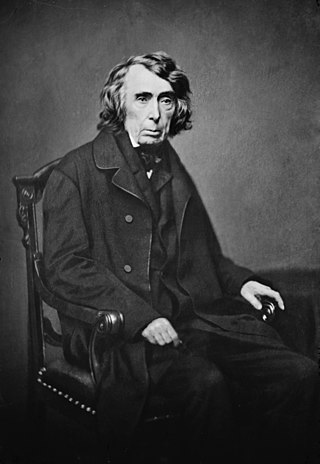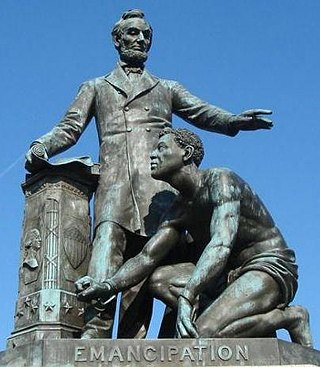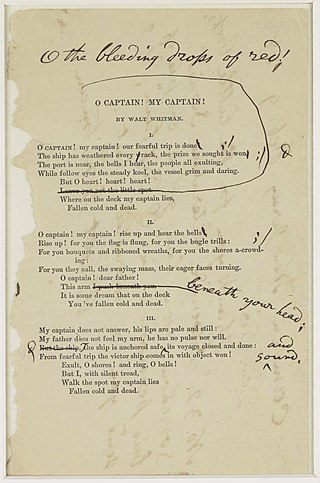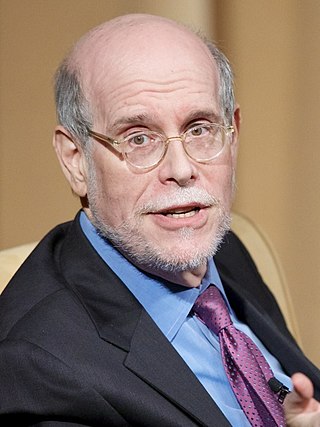
Abraham Lincoln was an American lawyer, politician, and statesman who served as the 16th president of the United States from 1861 until his assassination in 1865. Lincoln led the United States through the American Civil War, defending the nation as a constitutional union, defeating the insurgent Confederacy, playing a major role in the abolition of slavery, expanding the power of the federal government, and modernizing the U.S. economy.

The American Civil War was a civil war in the United States between the Union and the Confederacy, which was formed in 1861 by states that had seceded from the Union. The central conflict leading to war was a dispute over whether slavery should be permitted to expand into the western territories, leading to more slave states, or be prohibited from doing so, which many believed would place slavery on a course of ultimate extinction.

The Reconstruction era was a period in United States history following the American Civil War, dominated by the legal, social, and political challenges of abolishing slavery and reintegrating the eleven former Confederate States of America into the United States. During this period, three amendments were added to the United States Constitution to grant equal civil rights to the newly freed slaves. Despite this, former Confederate states often used poll taxes, literacy tests, and terrorism to discourage or prevent voting and intimidate and control people of color.

Ex parte Merryman, 17 F. Cas. 144 (No. 9487), was a controversial U.S. federal court case that arose out of the American Civil War. It was a test of the authority of the President to suspend "the privilege of the writ of habeas corpus" under the Constitution's Suspension Clause, when Congress was in recess and therefore unavailable to do so itself. More generally, the case raised questions about the ability of the executive branch to decline to enforce judicial decisions when the executive believes them to be erroneous and harmful to its own legal powers.
Ex parte Milligan, 71 U.S. 2 (1866), is a landmark decision of the U.S. Supreme Court that ruled that the use of military tribunals to try civilians when civil courts are operating is unconstitutional. In this particular case, the Court was unwilling to give former President Abraham Lincoln's administration the power of military commission jurisdiction, part of the administration's controversial plan to deal with Union dissenters during the American Civil War. Justice David Davis, who delivered the majority opinion, stated that "martial rule can never exist when the courts are open" and confined martial law to areas of "military operations, where war really prevails", and when it was a necessity to provide a substitute for a civil authority that had been overthrown. Chief Justice Salmon P. Chase and three associate justices filed a separate opinion concurring with the majority in the judgment, but asserting that Congress had the power to authorize a military commission, although it had not done so in Milligan's case.

In the 1860s, the Copperheads, also known as Peace Democrats, were a faction of the Democratic Party in the Union who opposed the American Civil War and wanted an immediate peace settlement with the Confederates.

The Union, colloquially known as the North, refers to the United States when eleven Southern slave states seceded to form the Confederate States of America (CSA), also known as the Confederacy or South, during the American Civil War. The Union was led by Abraham Lincoln, the 16th president of the United States, and sought to preserve the nation a constitutional federal union.

Samuel Freeman Miller was an American lawyer and physician who served as an associate justice of the U.S. Supreme Court from 1862 until his death in 1890 and who authored landmark opinions in United States v. Kagama and The Slaughterhouse Cases.
The Civil War Gold Hoax, also known as the Bogus Proclamation of 1864 was an 1864 unsuccessful financial hoax perpetrated during the American Civil War by American journalists Joseph Howard Jr. and Francis Mallison of the Brooklyn Eagle. Howard and Mallson hoped to exploit uncertainty about the ongoing war and trigger a sudden financial panic and profit from it. The conspirators bought gold on margin and then attempted to circulate a false proclamation from President Abraham Lincoln among New York newspapers, that called for a national day of prayer and the conscription of 400,000 additional men into the Union army. Howard and Mallison hoped that this proclamation would lead investors to believe that the Lincoln administration thought the war was going poorly, and cause them to abandon the Union greenback currency and instead buy gold, driving up its price. With the price of gold artificially inflated, the conspirators could sell high and make a considerable amount of money, before anyone realized the proclamation was a forgery.

Eric Foner is an American historian. He writes extensively on American political history, the history of freedom, the early history of the Republican Party, African American biography, the American Civil War, Reconstruction, and historiography, and has been a member of the faculty at the Columbia University Department of History since 1982. He is the author of several popular textbooks. According to the Open Syllabus Project, Foner is the most frequently cited author on college syllabi for history courses. According to historian Timothy Snyder, Foner is the first to associate the storming of the Capitol on January 6, 2021 with section three of the Fourteenth Amendment to the Constitution.

Abraham Lincoln's position on slavery in the United States is one of the most discussed aspects of his life. Lincoln frequently expressed his moral opposition to slavery in public and private. "I am naturally anti-slavery. If slavery is not wrong, nothing is wrong," he stated. "I can not remember when I did not so think, and feel." However, the question of what to do about it and how to end it, given that it was so firmly embedded in the nation's constitutional framework and in the economy of much of the country, even though concentrated in only the Southern United States, was complex and politically challenging. In addition, there was the unanswered question, which Lincoln had to deal with, of what would become of the four million slaves if liberated: how they would earn a living in a society that had almost always rejected them or looked down on their very presence.

"O Captain! My Captain!" is an extended metaphor poem written by Walt Whitman in 1865 about the death of U.S. president Abraham Lincoln. Well received upon publication, the poem was Whitman's first to be anthologized and the most popular during his lifetime. Together with "When Lilacs Last in the Dooryard Bloom'd", "Hush'd Be the Camps To-Day", and "This Dust Was Once the Man", it is one of four poems written by Whitman about the death of Lincoln.

The state of New Jersey in the United States provided a source of troops, equipment and leaders for the Union during the American Civil War. Though no major battles were fought in New Jersey, soldiers and volunteers from New Jersey played an important part in the war, including Philip Kearny and George B. McClellan, who led the Army of the Potomac early in the Civil War and unsuccessfully ran for President of the United States in 1864 against his former commander-in-chief, Abraham Lincoln.
Douglas L. Wilson is the George A. Lawrence Distinguished Service Professor Emeritus of English at Knox College in Galesburg, Illinois, where he taught from 1961 to 1994. He then was the founding director of the Robert H. Smith International Center for Jefferson Studies at the Thomas Jefferson Foundation (Monticello) in Charlottesville, Virginia. In his retirement, he returned to Knox College to found and co-direct the Lincoln Studies Center with his colleague Rodney O. Davis.

Harold Holzer is a scholar of Abraham Lincoln and the political culture of the American Civil War Era. He serves as director of Hunter College's Roosevelt House Public Policy Institute. Holzer previously spent twenty-three years as senior vice president for external affairs at The Metropolitan Museum of Art in New York before retiring in 2015.
The United Kingdom of Great Britain and Ireland remained officially neutral throughout the American Civil War (1861–1865). It legally recognized the belligerent status of the Confederate States of America (CSA) but never recognized it as a nation and neither signed a treaty with it nor ever exchanged ambassadors. Over 90 percent of Confederate trade with Britain ended, causing a severe shortage of cotton by 1862. Private British blockade runners sent munitions and luxuries to Confederate ports in return for cotton and tobacco. In Manchester, the massive reduction of available American cotton caused an economic disaster referred to as the Lancashire Cotton Famine. Despite the high unemployment, some Manchester cotton workers refused out of principle to process any cotton from America, leading to direct praise from President Lincoln, whose statue in Manchester bears a plaque which quotes his appreciation for the textile workers in "helping abolish slavery". Top British officials debated offering to mediate in the first 18 months, which the Confederacy wanted but the United States strongly rejected.

Roger Brooke Taney was an American lawyer and politician who served as the fifth chief justice of the United States, holding that office from 1836 until his death in 1864. Taney infamously delivered the majority opinion in Dred Scott v. Sandford (1857), ruling that African Americans could not be considered U.S. citizens and that Congress could not prohibit slavery in the U.S. territories. Prior to joining the U.S. Supreme Court, Taney served as the U.S. attorney general and U.S. secretary of the treasury under President Andrew Jackson. He was the first Catholic to serve on the Supreme Court.
This bibliography of Abraham Lincoln is a comprehensive list of written and published works about or by Abraham Lincoln, the 16th president of the United States. In terms of primary sources containing Lincoln's letters and writings, scholars rely on The Collected Works of Abraham Lincoln, edited by Roy Basler, and others. It only includes writings by Lincoln, and omits incoming correspondence. In the six decades since Basler completed his work, some new documents written by Lincoln have been discovered. Previously, a project was underway at the Papers of Abraham Lincoln to provide "a freely accessible comprehensive electronic edition of documents written by and to Abraham Lincoln". The Papers of Abraham Lincoln completed Series I of their project The Law Practice of Abraham Lincoln in 2000. They electronically launched The Law Practice of Abraham Lincoln, Second Edition in 2009, and published a selective print edition of this series. Attempts are still being made to transcribe documents for Series II and Series III.
Thomas Power Lowry is an American author and retired physician. A psychiatrist by training, he turned in the 1990s to writing historical non-fiction about the American Civil War. His reputation was damaged in 2011 when he made – and subsequently recanted – a written confession that he had tampered with a document signed by President Abraham Lincoln held in the U.S. National Archives.

Gary William Gallagher is an American historian specializing in the history of the American Civil War. Gallagher is currently the John L. Nau III Professor in the History of the American Civil War at the University of Virginia. He produced a lecture series on the American Civil War for The Great Courses lecture series.













